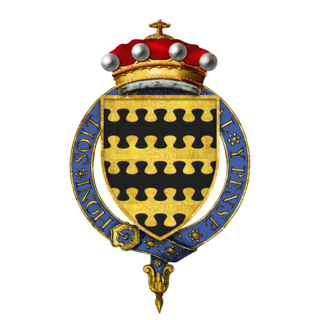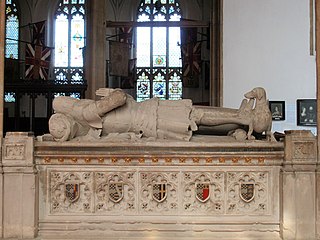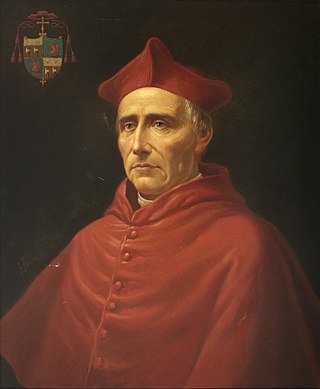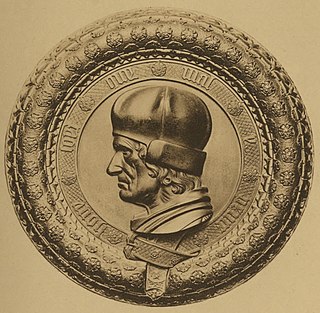Related Research Articles

Thomas Wolsey was an English statesman and Catholic bishop. When Henry VIII became King of England in 1509, Wolsey became the king's almoner. Wolsey's affairs prospered and by 1514 he had become the controlling figure in virtually all matters of state. He also held important ecclesiastical appointments. These included the Archbishop of York—the second most important role in the English church—and that of papal legate. His appointment as a cardinal by Pope Leo X in 1515 gave him precedence over all other English clergy.

John Colet was an English Catholic priest and educational pioneer.

Thomas Howard, 2nd Duke of Norfolk, styled Earl of Surrey from 1483 to 1485 and again from 1489 to 1514, was an English nobleman, soldier and statesman who served four monarchs. He was the eldest son of John Howard, 1st Duke of Norfolk, by his first wife, Catharina de Moleyns. The Duke was the grandfather of both Queen Anne Boleyn and Queen Katherine Howard and the great-grandfather of Queen Elizabeth I. In 1513, he led the English to victory over the Scots at the decisive Battle of Flodden, for which he was richly rewarded by King Henry VIII, then away in France.

Richard Foxe was an English churchman, the founder of Corpus Christi College, Oxford. He was successively Bishop of Exeter, Bath and Wells, Durham, and Winchester, and became also Lord Privy Seal.
Richard Pace was an English clergyman and diplomat of the Tudor period.

Henry Stafford, 1st Earl of Wiltshire was an English peer.

William Blount, 4th Baron Mountjoy, KG, of Barton Blount, Derbyshire, was an extremely influential English courtier, a respected humanistic scholar and patron of learning. He was one of the most influential and perhaps the wealthiest English noble courtier of his time. Mountjoy was known internationally as a humanist writer and scholar and patron of the arts.
William Knight was the Secretary of State to Henry VIII of England, and Bishop of Bath and Wells.

Sir Robert Drury (1456–1536) was an English knight, Lord of the Manor of Hawstead, Suffolk, and Knight of the Body to Kings Henry VII and Henry VIII. As a politician he was Knight of the Shire for Suffolk, Speaker of the House of Commons, and Privy Councillor. He was also a barrister-at-law. His London townhouse was on the site of today's Drury Lane.

Lorenzo Campeggio was an Italian cardinal and politician. He was the last cardinal protector of England.
The Royal Almonry is a small office within the Royal Households of the United Kingdom, headed by the Lord High Almoner, an office dating from 1103. The almoner is responsible for distributing alms to the poor.

Christopher Bainbridge was an English cardinal. Of Westmorland origins, he was a nephew of Bishop Thomas Langton of Winchester, represented the continuation of Langton's influence and teaching and succeeded him in many of his appointments such as provost of The Queen's College in the University of Oxford. Towards the end of the reign of King Henry VII, he was successively Master of the Rolls, a Privy Counsellor, Dean of Windsor and Bishop of Durham. Becoming Archbishop of York and therefore Primate of England in 1508, he was sent as procurator of King Henry VIII to the papal court of Pope Julius II, where he was active in the diplomatic affairs leading to Henry's war against France and took part in the election of Julius's successor, Pope Leo X. He was murdered by poisoning in Italy in 1514 and was succeeded as Archbishop of York by Thomas Wolsey.

Sir Thomas Lovell, KG was an English soldier and administrator, Speaker of the House of Commons, Secretary to the Treasury and Chancellor of the Exchequer.
Events from the 1490s in England.
Events from the 1500s in England.

Thomas Grey, 2nd Marquess of Dorset was an English peer, courtier, soldier and landowner of the House of Grey.
Sir William Compton was a soldier and one of the most prominent courtiers during the reign of Henry VIII of England.

Sir Robert Sheffield was an English lawyer and Member of Parliament. He was Speaker of the House of Commons between 1512–1513.
Thomas Magnus (1463/4–1550) was an English churchman, administrator and diplomat.
References
- ↑ G. R. Elton, The Tudor Revolution in Government (1953), p. 122.
- 1 2 3 4 5 . Dictionary of National Biography . London: Smith, Elder & Co. 1885–1900.
- ↑ Gairdner, Letters and Papers of Richard III and Henry VII, Rolls Ser. i. 405, &c.; Cal. State Papers, Venetian, i. 795, 799.
- ↑ David Starkey, Henry VIII: A Biography
- ↑ Thomas Fowler, The history of Corpus Christi college (1893), p. 15.
- ↑ H. C. Porter, Fisher and Erasmus, p. 87 in Brendan Bradshaw, Eamon Duffy (editors), Humanism, Reform and the Reformation: The Career of Bishop John Fisher (1989).
- ↑ Letter to Ruthall, in The Yale Edition of The Complete Works of St. Thomas More Volume 3, Part 1, Translations of Lucian